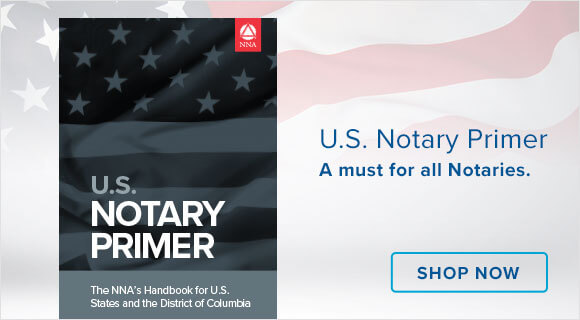
Notary Signing Agents are required to keep a signer's information in their journal records private. But what should you do if a lender, title company or signing service asks to look at your journal entries before they will offer you assignments? Remember that you can't bend federal and state privacy laws, no matter who asks.
Privacy rules for Notary journals
Notary Signing Agents should not allow a company to view non-customer journal records containing private personal information. Title companies are responsible for protecting confidential customer financial information under the federal Gramm-Leach-Bliley Act (GLBA), and inspecting journal entries that do not involve customers of the title company would violate GLBA rules. Subject to the exceptions listed below, the NNA recommends Signing Agents refuse to allow potential contracting companies to view their journals, since Signing Agents are bound to protect nonpublic personal information under the same GLBA rules.
State-specific exceptions
Some states have rules for providing access to journal entries that are exceptions to the normal privacy guidelines discussed above. Unless one of these stated exceptions applies, Notary Signing Agents should not allow a title company to inspect their journals as a condition for receiving assignments with that company.
Arizona — A journal entry that is a public record may be viewed by any person who presents a written request that details the name of the person whose signature was notarized, the month and year the act took place and the type of document or transaction (ARS 41-319[F]). Note that Arizona authorizes Notaries to keep a separate journal for notarial acts that are not public records. Journal entries that are not public records include entries containing information covered by attorney-client privilege or that are confidential pursuant to federal or state law. Journals that contain nonpublic records are the property of the Notary’s employer (usually a law firm) and must be kept confidential (ARS 41-319[E]).
California — Government Code 8206[d] states that the journal is the exclusive property of the Notary and prohibits a Notary from surrendering the journal to any person. The exceptions are a peace officer if the journal contains evidence related to a criminal investigation or to the county clerk when the Notary ends his or her career as a Notary.
However, a California Notary must provide a photocopy of a journal entry to anyone making a written request that includes the name of the parties involved in the notarization, the type of document, and the month and year the notarization took place (Government Code 8206[c]). A Notary-employee must permit an employer to inspect journal entries that are directly associated with the employer’s business provided the Notary is physically present. The employer may not require Notary employees to provide access to journal entries unrelated to the employer’s business (Government Code 8206[d]).
Colorado — Any member of the public may present a written request which includes the name of the parties, the type of document, and the month and year in which a record was notarized. Upon receiving this request, a Notary may provide a certified copy of the line item representing the requested transaction and charge the fee allowed in CRS Section 24-21-529. The Notary must record the transaction in the Notary’s journal (CRS 24-21-519[5]).
Hawaii — Hawaii Notaries must allow inspection of journal records by any responsible person without fee or reward (HRS 502-73).
Maryland — A Notary Public may charge $6 for certifying a copy of an entry in the Notary’s register of official acts (COMAR 01.02.08.02E). The fee for providing a photocopy of an entry in the register is $2 per copy (COMAR 01.02.08.02C).
Massachusetts — Notary journals may only be inspected without restriction by law enforcement, if subpoenaed by court order, or when the Secretary of the Commonwealth orders the Notary to surrender the journal (GL 222 Sec. 22[g]).
Mississippi — A Notary must provide photocopies of journal records to a person who requests them and pays the legal fee (MCA 25-33-5). Any person may inspect a journal entry in the Notary’s presence during regular business hours if (a) the person is personally known or provides satisfactory proof of identity to the Notary; (b) the person requesting the inspection signs a separate, dated entry in the Notary’s journal; (c) the person specifies the month, year, type of document and name of the principal for the notarial acts; and (d) the person is only shown the entries specified in the request. Only law enforcement, a court issuing a subpoena or the Secretary of State can request an unrestricted inspection of a Mississippi Notary’s journal. The Notary may deny access to the journal if the Notary has a reasonable and explainable belief that a person bears a criminal or harmful intent in requesting information from the journal (1 Miss. Admin. Code Pt. 5, R. 50.4.6.A and B).
Missouri — The journal may be examined and copied without restriction by a law enforcement officer in the course of an official investigation, subpoenaed by court order, pursuant to subpoena power as authorized by law, or surrendered at the direction of the secretary (RSMo 486.710.1).
Nevada — A Nevada Notary’s journal is open to public inspection without qualification (NRS 240.120[6]).
Oregon — Only Notaries who are public officials or employees are obligated to disclose journal records under Oregon’s public records laws (ORS 192.410-192.505). A Notary who is not a public official or employee is exempt from disclosing the journal contents, unless requested by the Secretary of State under OAC 160-100-0430(6).
Pennsylvania — A Notary must give a certified copy of the journal to a person who applies for it (57 Pa.C.S. 319[g.1.]).
Texas — Texas Notaries must provide a certified copy of any requested entry upon payment of the fee allowed by law within 10 days of the receipt of the fees (Government Code Section 406.014 and Texas Administrative Code, Title 1, Section 87.52[a]). If the Notary can't provide the certified copy by the 10th business day, the Notary must certify this fact in writing to the person requesting the copy on or before the 10th business day. The Notary must set a reasonable date and hour by which the certified copy will be provided and provide the copy by that date and time. If the Notary has inadvertently included personal identifiable information in the entry contrary to 1 TAC Section 87.50, the Notary must redact that personal information prior to the release of the certified copy.
Bill Anderson is Vice President of Government Affairs with the National Notary Association. David Thun is the Editorial Manager at the National Notary Association.

